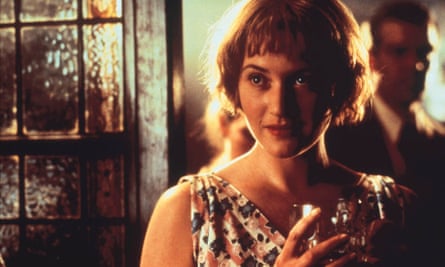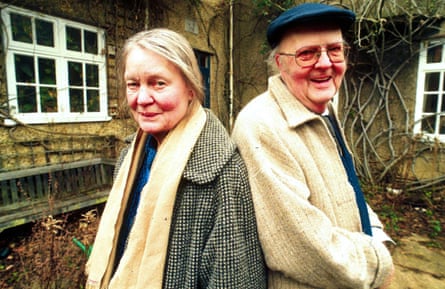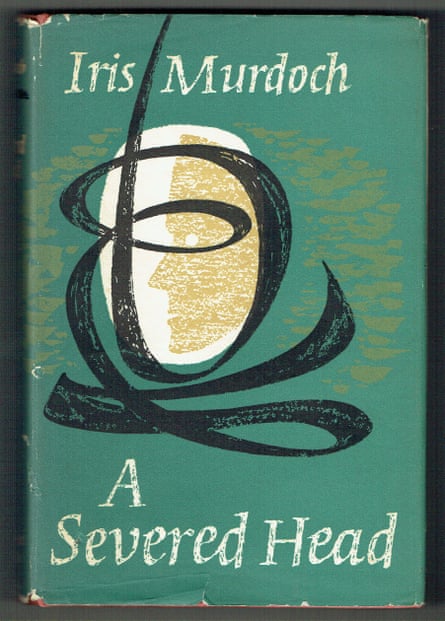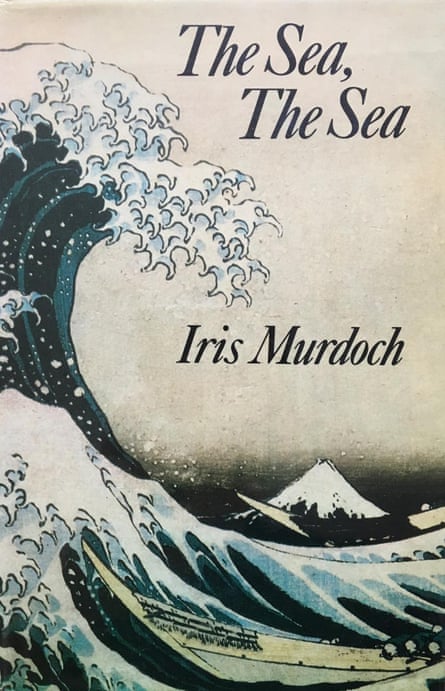 |
| Secret lives … Iris Murdoch in 1978. Photograph: Jane Bown |
Iris Murdoch at 100: ‘Her books are full of passion and disaster’
Love, sadness, fear, lust, power ... Murdoch’s strange, radical novels seethe with emotion. On her centenary, they are inspiring a new generation of authors
Alex Clark
Sat 13 Jul 2019 12.01 BST
Do Iris Murdoch’s novels still matter to people? Or, after the high-water mark of her Booker-winning 1978 novel, The Sea, The Sea, and a late period of longer, more philosophically abstruse books, did her work collapse into her biography – the jumble of love affairs, absurdly messy kitchens and Alzheimer’s disease that were dramatised by Kate Winslet and Judi Dench in the 2001 film of her life? And, once the attention paid to her life had abated, had contemporary fiction simply moved on?
A set of reissues to mark her centenary this week suggest that her 26 novels still resonate with novelists such as Sarah Perry, Daisy Johnson and Garth Greenwell, who have written new introductions to the works. Last year, when I took part in the Cheltenham literary festival’s annual Booker prize event – a classy balloon debate to determine who might have won the prize in the years before its invention – Murdoch’s The Bell (1958), championed by Madeleine Thien, only narrowly lost out to Chinua Achebe’s Things Fall Apart.
“What I love most about Murdoch’s writing is its accuracy in portraying the human experience at its most passionate and comically absurd,” says the novelist Sophie Hannah, who has written the introduction to Murdoch’s reissued 1973 novel The Black Prince. “People fall in and out of love at breakneck speed, and act in the most undignified and preposterous ways for reasons so insubstantial or intensely personal that it is hard to identify with them unless you perceive yourself to be equally ridiculous and changeable – which I absolutely do. Her characters speak the way we would all speak if we did not feel obliged to mask our true, unhinged psyches with the trappings of normality.”
For Charlotte Mendelson, who has written the introduction to Under the Net (1954), Murdoch’s novels “work for everyone because she understood our secret lives: falling in love with exactly the wrong person, maddened with inconvenient lust and sadness and fear. Her books are full of passion and disaster; I loved her as a teenager and will never stop.”
A crucial idea in Murdoch’s fiction is the reality of others, a material fact that we are confronted with daily but, in our innermost selves, seem hardly able to grasp. We glimpse them in continually evolving contexts inflected with our own agendas, which may also remain mysterious to us. That situation, often manifesting itself in the form of a dilemma, struck her as the novel’s primary concern. An essay she wrote in 1959 argues: “Prose literature can reveal an aspect of the world which no other art can reveal … and in the case of the novel, the most important thing to be thus revealed, not necessarily the only thing, but incomparably the most important thing, is that other people exist.”
To write a novel, Murdoch continues, is to quickly discover that “however much one is in the ordinary sense ‘interested in other people’, this interest has left one far short of possessing the knowledge required to create a real character who is not oneself. It is impossible, it seems to me, not to see one’s failure here as a sort of spiritual failure.”

Murdoch’s novels teem with characters who are opaque to one another, confusingly impulsive, acting out ruptures in their supposedly intimate relationships or with their personal histories. It is common for us to meet them in moments of crisis, sometimes entering a space already filled by a group of people at odds with one another. In The Bell, her fourth novel, a young woman, Dora, reunites with her estranged husband in the setting of a lay religious community. Among those she meets are a teenage boy who, unbeknown to him, has been strategically placed to watch over a dissolute drunk; a woman (the drunk’s twin sister) set on becoming a nun and a man once in love with the drunk, and disgraced in the process.
Soon after her arrival, Dora is shown the abbey to which the lay community is attached by the formidable Mrs Mark, and asks whether she can climb the tower. No, she is told, the order is enclosed, and “no one goes in or comes out”. Dora is horrified: “‘Do you mean,’ she said, ‘that they’re completely imprisoned in there?’” Mrs Mark is unperturbed, and laughs. “‘Not imprisoned, my dear,’ she said. ‘They are there of their own free will. This is not a prison. It is on the contrary a place which it is very hard to get into, and only the strongest achieve it. Like Mary in the parable, they have chosen the better part.’”
Why somebody would choose to be imprisoned, and what they choose to be imprisoned by, is the puzzle to which Murdoch repeatedly returns in her work. It is also the reason that, for all their surface narrowness – the rarefied classes from which her characters are drawn, the milieux that veer from haut establishment to threadbare bohemian, the endless trope of the love triangle and constant romantic volte-faces – her novels still speak to us.
Murdoch’s people are shapeshifters, even when she is being glib or incidental. Their relations with one another rarely stay the same, and their concept of themselves is subject to continual assault. In the most gothic of her novels, The Unicorn (1963), a young woman journeys to become a governess in a remote part of western Ireland. (It transpires that she is really to be a sort of companion to a woman confined to a castle by her absent husband, to whom she has been unfaithful.) Picked up from the station, “she saw in the shadowy interior what she took at first to be a large dog, but then recognised as a very pretty boy of about fifteen”. Later, she sees a seal that seems, “with its head of a primitive sea-god, like a portent”. Disturbing feelings and fears embodied by animals, the presence of roiling water, humans that can only be dimly made out: all classic Murdoch touches.From her debut Under the Net in 1954 to her final novel Jackson’s Dilemma, published in 1995, not long before her diagnosis of Alzheimer’s and four years before her death in 1999, her career ran in parallel with her life as a philosopher at the University of Oxford. She became a fellow there in 1948, teaching at St Anne’s College, and married John Bayley, who became Warton professor of English in 1974. In younger life and during the course of their marriage, she had affairs with both men and women (she famously described herself in a letter to her friend and fellow author Brigid Brophy as “a male homosexual in female guise”).For her detractors, her devotion to moral philosophy is written all too large on her fiction. Others take issue with the novels’ melodramatic situations; can we really take seriously the manic manipulations of theatre director Charles Arrowby in The Sea, The Sea when all he is really doing is cooking terrible meals in seclusion and messing with his ex-girlfriend’s head?

But Murdoch’s contrivances contained, for her, the terrifying truth that human beings, in the absence of God, are off the leash, motivated and animated by powerful internal forces beyond their apprehension, unable to conceive of goodness as an end in itself. “All altruism feeds the fat ego,” argues the priest in 1966’s The Time of the Angels: “People will endlessly conceal from themselves that good is only good if one is good for nothing … With or without the illusion of God, goodness is impossible to us. We have been made too low in the order of things.”
In that lowness, Murdoch found the subject of her novels, each to a greater or lesser degree peopled by delusionals and lunatics. Often, those who are compelled by the attempt to be good are the most dangerous, particularly when they have covered themselves in the cloak of mysticism, a recurring trope that allows Murdoch to study – in common with Muriel Spark – the devastating power of charisma.
When Murdoch’s novels falter a procession of unappealing people (“rebarbative”, as The Bell’s teenager Toby would have it) trail in and out of rooms saying bizarre things to each other and then catch a train to a country house to say something bizarre to someone else. Something horrid might happen to a dog, and then someone else will die or decide to get unsuitably married. They are, in other words, ripe for parody. But, at their best, they are thrillingly fabular, giving us the sense that we are witnessing a shadow play, our attention absorbed while elsewhere something fundamental takes place. Like Marian in The Unicorn, we are held in suspension, apprised of deeply disturbing knowledge and unsure what to do with it: “Her desire to go out was gone. She was afraid to step outside. She stood paralysed in the gateway for some time, keeping her breathing quiet. The great lawn at the cliff top remained cold and attentive, visible yet unreal, waiting to see what she would do.”
Five key works by Iris Murdoch
The Flight from the Enchanter (1956)
Murdoch’s second novel creates a monster in newspaper magnate Mischa Fox and circles a cast of chaotic characters, mainly women, around him in a portrait of glittering, rootless London. Written at the start of her partnership with John Bayley, it reflects on personal and public power.
The Bell (1958)
A great bell is coming to the religious community at Imber Court, to replace the ancient one that, legend has it, flew out of the abbey and threw itself in the lake after a novice’s tragic death. Murdoch uses the themes of enclosure and release as a basis to explore the nature of faith and its absence.

A Severed Head (1961)
An adulterous husband is surprised when his wife abandons him for a relationship with her psychoanalyst, but the chaos only increases with the arrival of anthropologist Honor Klein, who has a laser-like ability to cut through the torments of the bourgeoisie.
The Black Prince (1973)
Drawing inspiration from Hamlet, this novel centres on writer Bradley Pearson and his rivalry with his former protege Arnold Baffin. Crisis comes when Pearson falls in love with Baffin’s daughter, Julian, in a thicket-like narrative that presents itself as a story within a story, complete with postscripts from the leading players.

The Sea, The Sea (1978)
Murdoch’s Booker prize-winning novel, which parallels The Tempest, introduces playwright and director Charles Arrowby, who has decided to renounce the world and its works. But his plan is upended when he meets his former lover Hartley, and feels compelled to disrupt her quiet existence.


No comments:
Post a Comment